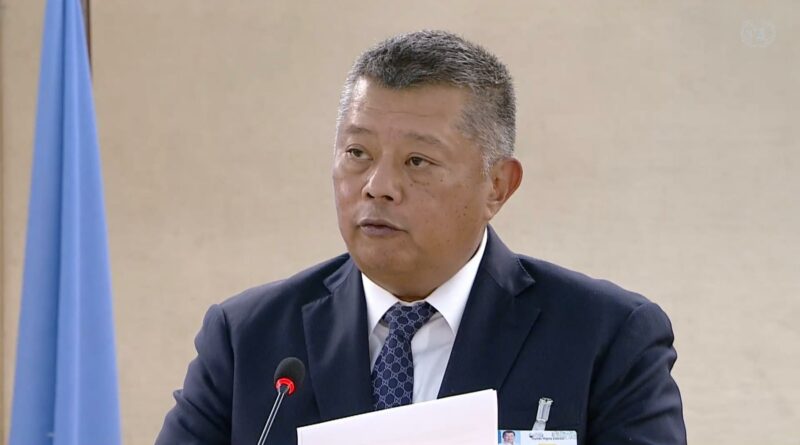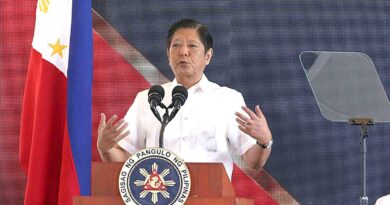DOJ to study House records amid renewed calls for ICC probe
Department of Justice Secretary Jesus Crispin Remulla on Wednesday said there is a need to look into the records of the House of Representatives amid renewed calls from lawmakers to allow the International Criminal Court (ICC) to probe the Duterte administration’s war on drugs.
“Hindi lang secondhand or thirdhand sources. Kinakailangan humingi kami ng transmittal sa Kongreso, tungkol sa mga usapin dito, sa mga detalyeng nangyayari, at sa mga ifa-file na resolusyon, kung anong nangyari sa komite bago ito lumabas,” Remulla said in a media briefing.
[Not only secondhand or thirdhand sources. We need to get a transmittal from Congress on this matter, on the details of what happened, and the resolution, on what happened in the committee before this was released.]
“Ito kasi mahalaga pagkat ako ay mambabatas dati, alam ko naman na may mga basehan ito, may pinangagalingan ito, may pinanghuhugutan. Kailangan makita namin ang mga naging usapan dito,” he added.
[This is important because I was a lawmaker before, I know that this has basis, this came from somewhere, this was drawn from something. We need to see the discussion that took place.]
Last week, the Makabayan bloc lawmakers filed a House resolution urging the government to cooperate in the ICC’s investigation on the alleged crimes against humanity committed during the previous administration’s anti-drug campaign.
House Deputy Minority Leader France Castro of ACT Teachers party-list said it is imperative for the government to allow the ICC to investigate as former President Rodrigo Duterte has admitted to ordering extrajudicial killings and financing them with his confidential and intelligence funds.
Meanwhile, Remulla said the DOJ will also study the ruling of the Supreme Court on the case of Cayetano v. Pangilinan, where the Court said that “withdrawing from the Rome Statute does not discharge a state party from the obligations it has incurred as a member.”
“A state party withdrawing from the Rome Statute must still comply with this provision. Even if it has deposited the instrument of withdrawal, it shall not be discharged from any criminal proceedings. Whatever process was already initiated before the International Criminal Court obliges the state party to cooperate,” the SC said.
“Until the withdrawal took effect on March 17, 2019, the Philippines was committed to meet its obligations under the Rome Statute. Any and all governmental acts up to March 17, 2019 may be taken cognizance of by the International Criminal Court,” it added.
According to the Justice Secretary, however, they must check if the decision is only an “obiter dictum.”
“Kung ito ay precedent or obiter lang. Obiter lang. Kung ito ay sinabi ng Korte sa pag ru-rule ng isang bagay. Kaya kailangan pag aralan nang husto ‘yan bago natin patulan ang ganitong sitwasyon,” Remulla said.
[If this is a precedent or an obiter only. If this was said by the SC in ruling the case. So we need to really look into this before we address the situation.]
Remulla said the government’s stance on allowing the entrance of the ICC has not changed.
Following the denial of the government’s appeal on the resumption of the ICC prosecutor’s investigation into the controversial drug war, numerous government officials, including President Ferdinand Marcos Jr. and Solicitor General Menardo Guevarra, have spoken against continued engagement with the ICC.
“Wala namang pagbabago sapagkat kailangan lang pag-aralan talaga ang bagay na ito sapagkat international law ang pumapasok dito. Pumapasok din dito ang ating Constitutional law, ang ating Korte… pumapasok rito ang ating batas… kailangan lang maingat tayo,” he said.
[Nothing has changed because we need to really look into this because this involves international law. This involves Constitutional Law, and our courts… our laws are involved in this… we need to be careful.]
“Sabi ko nga, kung ang iyong bansa ay may sistema ng hustisya na umaandar, eh bakit mo pauubaya sa ibang tao ang paghusga sa sarili mong bayan,” he added.
[Like I said before, if your country has a working justice system, why would you let other people decide for your country.]
When asked if the government’s stance may change, Remulla said he could not say there is no chance.
“Sapagkat ang batas ay talagang maaring magbago ang batas. Batas ang pinag uusapan natin no,” he said.
[Because the law can change. We are talking about the law.]
Under the drug war, at least 6,200 suspects were killed in police operations based on government records. Human rights groups, however, claimed the actual death toll could be from 12,000 to 30,000.
In 2019, the Philippines, under then-President Duterte, withdrew from the Rome Statute, the treaty that established the ICC, after the tribunal began a preliminary probe into his administration’s drug war, followed by the launch of a formal inquiry later that year.—LDF, GMA Integrated News




